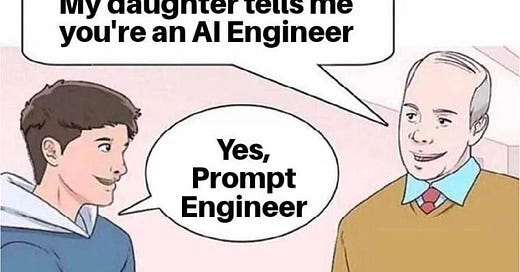Prompt Engineering: Why Your Tech Career Shouldn't Rest on Vibes and Creative Writing
The No-BS Guide to Building ML Skills That Actually Matter: A Journey Beyond Prompt Engineering Hype
This meme made me laugh, but it also got me thinking about something serious we need to discuss in the AI/ML community.
Here's the thing - prompt engineering is hot right now. Companies are throwing six-figure salaries at prompt engineers, and everyone's jumping on the bandwagon. But let's take a step back and think about this critically.
Keep reading with a 7-day free trial
Subscribe to MLWhiz | AI Unwrapped to keep reading this post and get 7 days of free access to the full post archives.




